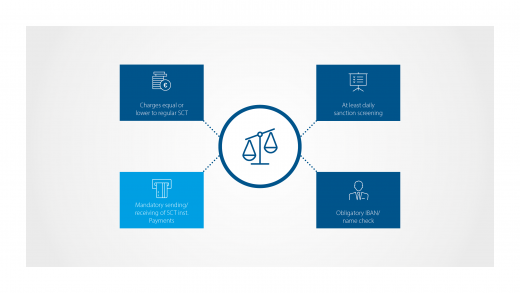Instant payments legislation is rapidly approaching… are you ready?
Since the SEPA Instant Credit Transfer (SCT Inst) scheme became effective in November 2017, it has seen great success in some countries. For example, major PSPs in the Netherlands collectively introduced instant payments in 2019 and they have positioned it as ‘the new normal’. This means that all consumer-to-business (C2B) and peer-to-peer (P2P) transactions that are initiated via mobile or web channels are processed as SCT Inst as a standard. At the moment, however, corporate payments are typically still executed as regular SEPA Credit Transfer (SCT) as the scheme only supports single transactions.
Overall, however, adoption has been limited. While 71% of all PSPs in the SEPA area have joined the scheme, only 14% of the total number of credit transfers in the SEPA area are instant payments. There are many reasons for this, but the European Commission acknowledges four main problems:
- Insufficient incentives for PSPs to offer SCT Inst
- Dissuasive transaction charges for SCT Inst compared to other payment methods
- High rejection rate of SCT Inst transactions related to sanction screening
- Payer concerns with regards to security of SCT Inst transactions
To boost instant payments in the SEPA area and to address the associated challenges, the European Commission (EC) published a legislative proposal in October 2022.
EC legislative proposal aims to speed up adoption
The legislative proposal by the European Commission introduces four main requirements to which European PSPs will have to adhere shortly after the new regulation enters into force (the precise date is unknown at the time of writing).
1. Mandatory implementation of SCT Inst
PSPs are confronted with a set timeline to implement instant payments. They must be ready and able to receive instant payments within six months of the regulation entering into force, and the mandatory implementation of sending instant payments across the SEPA area must be realised within 12 months. This applies to all credit institutions acting as PSPs and all channels with which clients can currently initiate regular SCT transactions. This means PSPs of all sizes in the SEPA area are equally impacted and must organise themselves to receive and send instant payments.
The purpose of this requirement is to create the necessary reach for instant payments so that SCT Inst is fully interoperable in the SEPA area and to boost adoption. This requirement has a big impact on PSP payment infrastructure and operations, and the timelines that have been proposed further increase the pressure:
Payment infrastructure
- PSPs adopting the SCT Inst scheme must review current payment processing IT infrastructure and develop entirely new systems to process instant payments across all channels. This impact is mostly visible across three dimensions:
- Instant processing of payments requires end-to-end processing within seconds
- 24/7/365 availability of systems requires continuous availability of payment processing without an option for downtime for maintenance and upgrades
- Single payment processing, moving away from traditional batch payment processing
- Payment rails are complex and intertwined with other systems and processes in the PSP’s IT infrastructure. To upgrade existing infrastructure to SCT Inst, PSPs must carefully review how existing (legacy) IT is impacted.
- Handling transactions 24/7/365 and instantly also means making changes in existing operational processes. Operations that are impacted include customer support, treasury, fraud & compliance monitoring, IT incident support & maintenance, and risk. This means that PSPs must rethink payment processing operations and ancillary processes to be compliant with upcoming instant payments legislation and to process payments continuously and safely. For example, PSPs might need to have additional customer support staff to handle questions and complaints about payment rejections, for exception handling or to perform other essential tasks such as liquidity management.
- It is important to note that the proposed timelines are very short, especially for PSPs that are yet to start their SCT Inst implementation journey. Implementing a new system facilitating instant payments is complex and time-consuming. PSPs would be wise to start their implementation efforts sooner rather than later to avoid running out of time as the implementation deadline approaches.
2. SCT Inst charges must be equal to or lower than regular SCT
The legislative proposal requires all PSPs within the scope of the proposal to offer instant payment transactions for charges equal to or lower than regular SCT transactions. This means that instant payments can no longer be offered at a premium price, as is currently the case with some PSPs. However, this requirement excludes payment initiation service providers (PISPs), who will find themselves in a different category with more freedom to explore business models.
Once again, this requirement aims to remove barriers to the adoption of SCT Inst. However, it also means that it will be more difficult for PSPs to earn back investments made in instant payments. The required allocation and prioritisation of resources and capital for SCT Inst implementation can already be a bitter pill to swallow due to the apparent lack of commercial upside as well as client demand.
On the other hand, commercial business models around value-added services based on SCT Inst rails also lead to new business opportunities, such as Request to Pay, reconciliation for corporates or trade finance optimisation.
3. Sanction screening at least daily
Currently, regular SEPA Credit Transfers (SCTs) as well as SCT Inst transactions are automatically screened against sanction lists on a per-transaction basis. This works well for SCTs as there is enough time available to screen against sanction lists before routing them to the clearing and settlement mechanism. However, PSPs have signalled that this is difficult to manage for SCT Inst transactions because it is impossible to review single transactions within seconds. In the past, this has resulted in a relatively high number of false positives, i.e. transactions that were wrongfully selected for investigation and therefore not processed instantly.
To solve this issue, the regulatory proposal includes a change to perform sanction screening on a “very frequent or at least daily” basis. This is expected to reduce the number of false positives incurred and thus increase the rate of straight through processing (STP). The impact of this requirement on PSPs is minor and it is appreciated by many institutions (e.g. ECB, ESBG). It should reduce the operational effort by PSPs as the screening of transactions can be done more efficiently. However, a downside to this requirement is that it implies operating different processes for handling sanctions for regular SCTs and SCT Inst transactions.
It should be noted that the legislative proposal only covers requirements with regards to the EU’s restrictive measures and sanction lists. Additional local requirements for sanction screening may apply.
4. Obligatory IBAN/Name check
In the current legislative proposal, it is mandatory to incorporate an IBAN/Name check to match the beneficiary’s name against the IBAN. The goal of this requirement is twofold. On the one hand, consumers can see whether the beneficiary’s name matches the IBAN. This is expected to enhance the user experience and customer trust in instant payments. On the other hand, an IBAN/Name check is an effective way of reducing fraud resulting from a mismatch between the beneficiary name and IBAN.
In the case of the IBAN/Name check, it is key to guarantee interoperability whereby selecting the right vendor can be a challenge. A few solutions are already available (e.g. Surepay, Bluem, Nexi), with Surepay currently offering reach across several European countries (e.g. NL, FR, BE, DE).
Good progress towards harmonising SCR INST Across Europe
Although the above issues raise some concerns, much progress has been made towards boosting SCT Inst in recent years. For example, there is now a clear approach for organising the interoperability of clearing and settlement of instant payments. All PSPs and clearing houses connected to TARGET2 are reachable on Target Instant Payments System (TIPS), the clearing and settlement mechanism designed by the European Central Bank (ECB) to handle 24/7 settlement of instant payments. This guarantees interoperability across the SEPA area.
Additionally, ‘Software as a Service’ (SaaS) providers (e.g. Sopra, FIS, Avaloq) have built strategic propositions around instant payments, facilitating 24/7 availability for PSPs and also offering end-to-end processing and messaging capabilities. This helps PSPs with speedy implementation of instant payments while limiting the fundamental changes needed to existing payments infrastructure.
Last but not least, the SCT Inst scheme is evolving from a voluntary scheme into an enforceable regulation. This will create a level playing field for all PSPs in the SEPA area, all of which will be required to make similar efforts to upgrade their payments infrastructure and processes. Moreover, the scheme will help to strengthen the payments capabilities in the SEPA area to keep pace with – or stay ahead of – payment infrastructures in other geographies.
instant payments will soon be here
To conclude, although various concerns have arisen from the legislative proposal, the EU has already taken many steps towards a unified SCT Inst landscape. The EC’s ultimate goal is now clearer than ever: to establish SCT Inst as the ‘pan-European new normal’ to drive innovation in payments and reduce the current dependency on non-European payment methods.
Stay tuned!
Contact us







